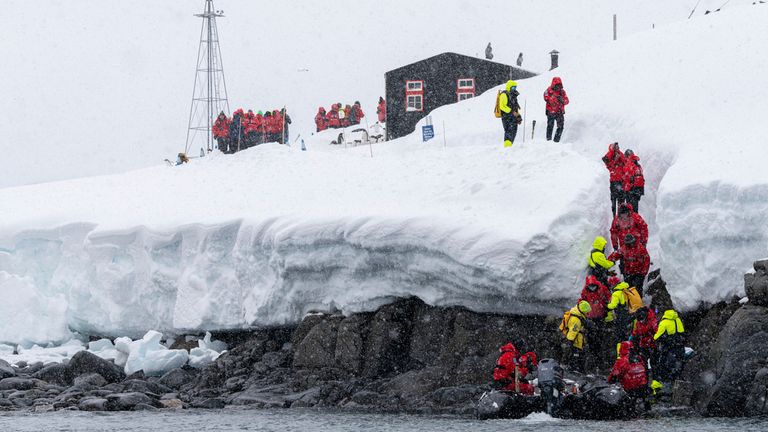Antarctica heatwave linked to climate change - after temperatures soared 39C above normal
Temperatures in an area of east Antarctica - known as "Dome C" - soared to 39C above normal, reaching -10C, on 18 March last year. Now, a recent study has pinpointed what caused the heatwave.
Monday 25 September 2023 14:07, UK
Scientists have uncovered the link between a world-record heatwave in Antarctica and climate change.
Temperatures in an area of east Antarctica - known as "Dome C" - soared to 39C above normal, reaching -10C, on 18 March last year.
Relatively, it was the most intense heatwave ever recorded anywhere on the planet.
Only a handful of heatwaves more than 35C hotter than normal have been recorded before - in Siberia, North America, and Antarctica.
Because of Antarctica's harsh environment and remote location, there is often not enough data to determine whether climate change played a role in such an extreme weather event.
Now, a recent study has pinpointed what caused the heatwave.
The authors say a "highly unusual" weather pattern triggered strong winds from the north, bringing warm and moist air from Australia, and it was made 2C worse by climate change.
The findings add to concerns that climate change is finally catching up with Antarctica, which once seemed relatively shielded.
The experts warned such heatwaves - which to some extent occur naturally - will get hotter still due to climate change.
The research was published in peer-reviewed journal Geophysical Research Letters.
'Real danger' for Antarctica
It is one of many records recently smashed in Antarctica.
In August, a group of scientists - tasked by the UK Foreign Office to investigate the "unprecedented" changes - warned of "global consequences", including rising sea levels.
They said there was a "real danger" the frozen continent would stop acting as a refrigerant for the planet, and start "acting as a radiator".
Read more:
Antarctic sea ice at record low for end of June
UK's largest lake has turned into 'a toilet'
How will delay to electric car and gas boiler switch affect me?
United Nations climate scientists say average and extreme heat are increasing on every continent due to human-caused climate change.
The World Weather Attribution group of researchers, who assess whether climate change is to blame for extreme weather events, says every heatwave in the world is now made stronger and more likely to happen because of human-caused climate change.
Watch The Climate Show with Tom Heap on Saturday and Sunday at 3pm and 7.30pm on Sky News, on the Sky News website and app, and on YouTube and Twitter.
The show investigates how global warming is changing our landscape and highlights solutions to the crisis.
